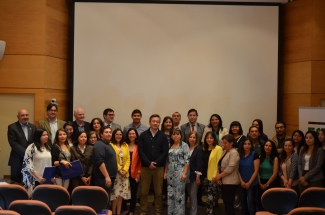REPRC-EfD Research Recommends Review of Nigeria’s Fishery Act
Following the data collection process for the Fishery Performance Indicators, researchers at The Resource and Environmental Policy Research Centre, Environment for Development (REPRC-EfD) Nigeria
Closing ceremony with principals, teachers and the regional representative of the Ministry of Environment in the Bio-Bio Region.
The project focused on evaluating the direct and indirect effects of an educational program on students’ and parents’ knowledge, attitudes, and practices (KAP) regarding consumption and disposal of
Analyzing the effect of biodegradable packaging on plastic consumption in the wholesale market: a field experiment in the Costa Rican farmer’s market
Command and control instruments, such as Plastic-bag bans, have been effective in countries with a strong enforcement mechanism. In developing countries, these instruments have been partially
Reducing marine debris pollution by changing household behavior through children education
This paper aims at evaluating the direct and indirect effects of an educational program on students’ and parents’ knowledge, attitudes, and practices (KAP) regarding the consumption and disposal of
Collective Share Quotas and the Role of Fishermen’s Organizations in Ex-Vessel Price Determination
This article examines the collective bargaining efforts of atomized fishermen with a monopsony-like buying sector. Government allocation of collective share quotas to fishermen’s organizations triggered the voluntary formation of cooperative fishermen’s bargaining associations, while a highly concentrated processing sector started behaving as a countervailing monopsony. This drove ex-vessel price determination into region-specific bilateral monopoly price bargaining.
Ocean Acidification, Consumers' Preferences, and Market Adaptation Strategies in the Mussel Aquaculture Industry
Ocean acidification (OA) is one of the largest emerging and significant environmental threats for the aquaculture industry, jeopardizing its role as an alternative for supporting food security. Moreover, market conditions, characterized by price volatility and low value-added products, could exacerbate the industry's vulnerability to OA.
Celebrity endorsement in promoting pro-environmental behaviour
There is greatly growing attention to tackling plastic pollution issues. Previous studies proposed various instruments dealing with plastic problems. Education and information programs are frequently
A framework for selecting and designing policies to reduce marine plastic pollution in developing countries
The polluting of marine ecosystems with plastics is both a global and a local problem with potentially severe consequences for wildlife, economic activity, and human health. It is a problem that originates in countries’ inability to adequately manage the growing flow of waste. We use an impact pathway framework to trace the flow of plastics through the socio-ecological system and identify the role of specific policy instruments in achieving behavioral changes to reduce marine plastic waste. We produce a toolbox for finding a policy that is suitable for different countries.
Pagination
- Previous page
- Page 16
- Next page

